
The movie
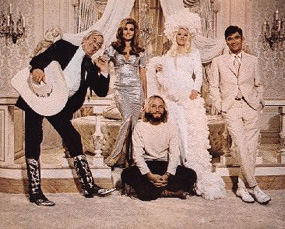
Director Michael Sarne (front) with the stars of the 1970 film (from left) John Huston, Raquel Welch, Mae West and Rex Reed
The 1970 Twentieth Century-Fox Film production is unfairly derided as one of the worst movies ever made. In fact, it contains much creative genius and is a ton of fun.
Michael Sarne's film of Gore Vidal's Myra Breckinridge was released in late June of 1970. The film had had a difficult gestation, and its birth and early life were painful for the studio, the young director and virtually everyone involved.
But let's face it: From the outset it was obvious that this was going to be a difficult project. Even in 1970 -- at the height of promiscuity in films -- how in the world could anyone successfully bring to the screen a story whose highlight is the female lead's dildo rape of a young man?
If such a production were possible, the earliest signs were positive. A major studio -- Twentieth Century-Fox -- had taken on the project. There was, for those days, an ample budget ($3 million), and the original writers and director were established or promising talent.
For better or -- perhaps in this case -- worse, there was a star-studded cast: Raquel Welch as Myra, John Huston as Buck, Mae West as Letitia, as well as at least a couple stars-to-be (Farrah Fawcett as Mary Ann and Tom Selleck as an aspiring actor).
But all hell broke loose early on:
Despite Welch's initial efforts to work with West, it wasn't long before they refused to appear in scenes together.
Robert Fryer, the producer, quit and came back three times;
Bud Yorkin, the original director, quit and was replaced by Sarne, who was accused of alienating the cast;
Author Gore Vidal, who was supposed to help write the script, fled to Italy in disgust; Sarne and David Giler finished the script;
All of this trouble and more was being discussed openly in newspapers and magazines, on talk shows and in the trade press. Those talking the most included movie critic Rex Reed (Myron in the film), who penned a scathing piece for the August 1970 issue of Playboy.
In the end, Fox simply stopped production. Many of the scenes Sarne devised were never filmed (Welch had refused to perform some of them as written anyway); he "finished" the film with the footage he had in the can when Fox pulled the plug.
The movie premier was in New York. West attended and was greeted by an adoring crowd; once again she upstaged Welch, for whom one had to feel a bit sorry. And the critics had a feeding frenzy:
"About as funny as a child molester" -- Time
"A horrifying movie ..." -- Newsweek
"A new low in amateur squalor" -- Look
"The bad taste is beyond belief." -- Variety
Yet somehow things got worse.
The film was littered with old movie clips, many of which were juxtaposed with unorthodox Myra scenes like the dildo rape. When Loretta Young heard that a clip of her was used in the context of the rape scene, she filed suit in Cleveland and won.
Rather than dump another million bucks into the film (in the form of payment to Young), Fox went back into production, cut the clip in question, distributed new prints, and gathered up and destroyed all of the original prints.
Ultimately, the film cost at least $5 million and grossed only $4.3 million. Still today it seems to be a lingering embarrassment to Fox. There was an early (circa 1980) video release on the Magnetic label. But at a time when virtually every studio is releasing virtually every old film on video, Fox seems content to keep this one under wraps.
Curiously, though, Myra Breckinridge has become a cult classic. Chief among its enthusiasts is the gay community, which can't get enough of Mae West and Roger Herren, the very hunky rape victim. And, all in all, for anyone into camp, there's much to enjoy.
Myra's established stars -- Welch, Huston and West -- survived Myra well enough. And it certainly caused no lasting harm to supporting cast members Fawcett and Selleck. Author Vidal, of course, went on to further success with many other books.
Two key Myra players barely survived the ordeal. Sarne has done little directing work since. The only other known follow-up work by Herren, apparently irreparably stigmatized by his role, was as "Cowboy" in the west coast stage production of Boys in the Band.
More about the movie:

Dying to see the film? You have
a few, albeit limited, options:
· To rent it, check your locally owned video store -- one that has a
cult film section.
· To see it on TV, keep an eye on the premium cable channels; Cinemax,
in particular, occasionally shows Myra B.
· To buy a copy, watch the auctions at ebay
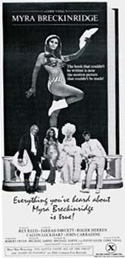
As with any film, there were a variety of
advertisements that ran in newspapers.
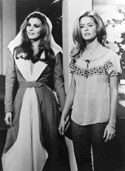
Raquel Welch as Myra and Farrah Fawcett as
Mary Ann Pringle in a scene that did not make it into the final print.
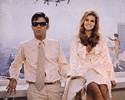
Rex Reed as Myron and Raquel Welch as Myra
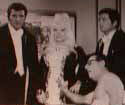
There's one wild party scene in the movie
(and a couple in the book).
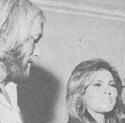
Director Mike Sarne and Raquel Welch in a
seemingly friendly encounter. Most say their relationship was not particularly warm during the filming.
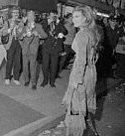
Raquel Welch at the film's premier.
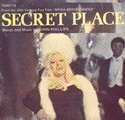
Sheet music for Mae West's two songs was
available in music stores.